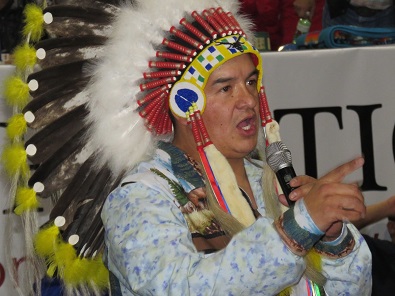FSIN Chief Bobby Cameron file photo
The Federation of Sovereign Indigenous Nations says that two days of public consultations on the provincial pasture program are not enough for it to be meaningful consultation with First Nations.
Chief Bobby Cameron was reacting to the province’s plans for two public meetings on the future use of lands that are part of the Saskatchewan Pastures Program. The program consists of approximately 780,000 acres located at 51 sites throughout the province. The provincial government announced in its March budget that it would be phasing out the Provincial Pastures Program within three years, with 2017 being the last year it fully operates.
He says consultation is a lengthy process and that two meetings in the afternoon for two days is not proper consultation. He suggests the province start the conversation a different way.
“Here is a piece of land, so and so First Nation, are you interested in buying it? And if so, here are some of the prices. That’s consultation, and not coming to a meeting and saying that here are some Crown Lands and pastures that are potentially up for sale,” he says. “The way they are doing it is totally wrong.”
“We have Inherent and Treaty rights over all Crown lands: pasture lands, wildlife lands, provincial parks and national parks, and all bodies of water,” he adds. “Any potential sale will impact all of our First Nations.”
Cameron says that without proper consultation with First Nations on these parcels, the province is breaching its lawful obligation to give bands the first opportunity to purchase Crown lands through the Treaty Land Entitlement or specific claim process.
He says he will bring it up with Agriculture Minister Lyle Stewart when they meet on May 16 along with representatives of the Ochapawace First Nation.
“We (the FSIN) will do what it can to to ensure our First Nations have the first right of refusal in purchasing these Crown Lands,” he adds.
He says the FSIN will be watching this issue very closely as the government has a legal obligation to First Nations on this issue.
Provincial officials were not immediately available for comment.
